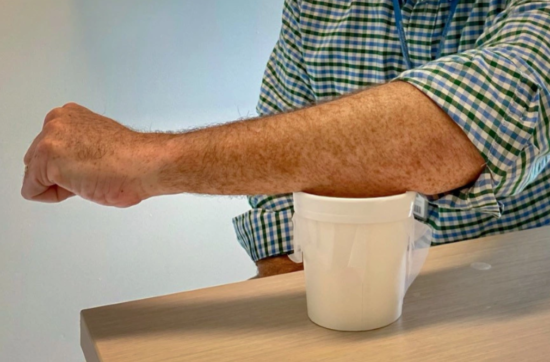Microscopic antibiotic robots, vax by mosquito bite, STIs’ big jump, and more
23 Sep 2022
Posted by Andrew Kantor
Action stations! Action stations!
Urgent call to action: Stop Express Scripts from Limiting Access for Tricare patients
Here’s what’s what:
The DoD has a new contract with Express Scripts — one that will likely cut Tricare’s pharmacy network by a third.
That could be devastating for servicemembers and their families — the people who trust and rely on their neighborhood community pharmacies for their treatments.
Making it worse, Express Scripts is telling patients that their pharmacies will no longer be in-network as of October 24, 2022 — two months before the new contract takes effect.
What GPhA is doing
A letter to Defense Health Agency Acting Assistant Secretary Seileen Mullen — one championed by GPhA and the Arkansas Pharmacists Association — has grown into a response by 34 state associations thanks to the efforts of APhA and NASPA.
GPhA also helped draft a letter to the DHA from pharmacy champs Congressmen Buddy Carter and US Senator Tom Cotton of Arkansas. They want to know why Express Scripts is being allowed to shrink the retail-pharmacy network and reduce reimbursements — effectively cutting patients off from their community pharmacies.
And now we’re calling you to action.
You can help (and it’s super easy)
Help Rep. Carter and Sen. Cotton get more congressional signatures on their on their letter. You can use NCPA’s simple form to ask your representative (and Georgia senators Jon Ossoff and Raphael Warnock) to sign the letter by the September 28 deadline. Click here, enter your name and address, and NCPA will do the rest.
Thank you — greatly! — for using your voice!
The right diabetes drugs
You start with metformin, usually, but when treating type-2 diabetes, what’s next? Based on a big NIH study, it should be insulin glargine and liraglutide.
Those two drugs came out on top after a nine-year study of more than 5,000 patients across with type 2 diabetes.
[P]articipants taking metformin plus liraglutide or insulin glargine achieved and maintained their target blood levels for the longest time compared to sitagliptin or glimepiride. This translated into approximately six months more time with blood glucose levels in the target range compared with sitagliptin, which was the least effective in maintaining target levels.
Insulin pump hacker warning
The FDA is warning that the communication system used by the Medtronic MiniMed 600 Series Insulin Pump is vulnerable to hackers. In theory, “the pump’s communication protocol could be compromised, which may cause the pump to deliver too much or too little insulin.”
Reality check: As cool as this is for a medical-thriller plot…
For unauthorized access to occur, a nearby person other than you or your care partner would need to gain access to your pump at the same time that the pump is being paired with other system components. This cannot be done over the internet.
Just in case, though, Medtronic has advice for patients.
Robot pneumonia fighters
Let’s say you have mice with pneumonia — the really bad kind. If you inject antibiotics, you’ll need a huge dose; the meds will be dispersed throughout the body. It’ll work, but the side effects can be a problem.
Obviously, you turn to microscopic robots. They’re small enough to literally swim into the lungs, right where the P. aeruginosa bacteria is, and kill it … with 1/3000th the dose of antibiotics.
UC San Diego engineers created these very robots. They’re made of algae coated with antibiotic nanoparticles, and they swim right to the lungs to attack bacteria. They’re also designed to neutralize the inflammatory molecules the bacteria produce, making them both small and mighty.
Oh, and they worked: “In mice the microrobots safely eliminated pneumonia-causing bacteria in the lungs and resulted in 100% survival.”
Next up: More research and hopefully scaling this up for human trials.
You’ll need a different room if you’re gonna give vaccinations this way
A malaria vaccine trial at the University of Washington delivered the vaccine using — wait for it — mosquitoes: “We use the mosquitoes like they’re 1,000 small flying syringes,” as the lead researcher put it.
The insects deliver live malaria-causing Plasmodium parasites that have been genetically modified to not get people sick. The body still makes antibodies against the weakened parasite so it’s prepared to fight the real thing.

Better you than me: There are 200 mosquitoes in the container, each filled with genetically modified parasites.
Why? Because at the early stage, it’s faster to create a parasite that can grow inside a mosquito than it is to create one that can be delivered by needle. Eventually, of course, any actual shot would be given by a human. Probably.
Hold your applause
STD rates jumped big time in 2021, according to preliminary CDC data. We’re talking a yuge surge:
The number of new syphilis infections surged 26% between 2020 and 2021, with 52,354 cases of primary and secondary syphilis reported last year, according to the data. That’s compared to a 7% increase in new syphilis infections from 2019 to 2020.
Most of the jump is likely due to Covid disruptions of care centers, plus funding cuts to public health programs that provide STI testing for the uninsured.
The world smiles with you, and you smile
Research continues on using low-dose ketamine treatment to fight severe depression. Here’s an unusual one: You can prolong the ketamine’s effect by showing patients pictures of people smiling at them.

I feel better already
Right after treatment, it seems that the brain is a bit more plastic and receptive. That’s when you hit ’em with “positive words and pictures designed to boost self-worth,” according to University of Pittsburgh psychiatry researchers.
The strategy […] pairs a single ketamine injection with automated computer-based training that uses positive words and imagery to influence how a person sees themselves. Words like “sweet,” “loveable” and “worthy” appear on the screen along with the patient’s photo and images of people smiling.
The result (preliminary, of course) is that that positivity help the treatment last longer than just ushering folks out the door with a handshake. Research, of course, is ongoing.
Three times as bad as the flu
President Biden: “The pandemic is over.”
Hospitals across the country: “You know that more than 300 Americans a day are dying from it, right?”
Georgians: “And you know there are almost 1,200 Georgians currently in hospital*, and 20 die from it every day, right?”
The Atlantic: “The ‘End’ of COVID Is Still Far Worse Than We Imagined”!


